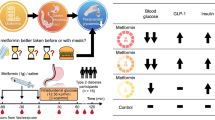Abstract
This review critically evaluates the current evidence regarding the effect of the dietary glycemic index (GI) on pregnancy outcomes in gestational diabetes mellitus (GDM). Current evidence, although limited, consistently supports the advantages of, and has demonstrated no disadvantages of, a low-GI diet. We conclude that pregnant women with GDM are likely to benefit from following a low-GI meal pattern, with no significant side effects, and consideration of the GI should be given when formulating a diet for GDM. However, until larger scale intervention trials are completed, an exclusive low-GI diet should not replace the current recommended diets for GDM from relevant government and health agencies. Further studies that intervene at an earlier stage of pregnancy are required.

Similar content being viewed by others
References
Papers of particular interest, published recently, have been highlighted as: • Of importance •• Of major importance
American Diabetes Association. Diagnosis and classification of diabetes mellitus. Diabetes Care. 2009;32:S62–67.
Kaaja R, Rönnemaa T. Gestational diabetes: pathogenesis and consequences to mother and offspring. Rev Diabet Stud. 2008;5:194–202.
Damm P, Vestergaard H, Kuhl C, Pedersen O. Impaired insulin-stimulated nonoxidative glucose metabolism in glucosetolerant women with previous gestational diabetes. Am J Obstet Gynecol. 1996;174:722–9.
Kautzky-Willer A, Prager R, Waldhausl W, et al. Pronounced insulin resistance and inadequate betacell secretioncharacterize lean gestational diabetes during and after pregnancy. Diabetes Care. 1997;20:1717–23.
Setji TL, Brown AJ, Feinglos MN. Gestational diabetes mellitus. Clin Diabetes. 2005;23:17–24.
Buchanan TA, Xiang AH, Buchanan TA, Xiang AH. Gestational diabetes mellitus. J Clin Invest. 2005;115:485–91.
Morikawa M, Yamada T, Yamada T, et al. Change in the number of patients after the adoption of IADPSG criteria for hyperglycemia during pregnancy in Japanese women. Diabetes Res Clin Pract. 2010;90:339–42.
Moses RG, Morris GJ, Petocz P, et al. The impact of potential new diagnostic criteria on the prevalence of gestational diabetes mellitus in Australia. Med J Aust. 2011;194:338–40.
O’Sullivan E, Avalos G, O’Reilly M, et al.: Atlantic Diabetes in Pregnancy (DIP): the prevalence and outcomes of gestational diabetes mellitus using new diagnostic criteria. Diabetologia 2011:1–6.
International Association of Diabetes and Pregnancy Study Groups Consensus Panel. International Association of Diabetes and Pregnancy Study Groups recommendations on the diagnosis and classification of hyperglycemia in pregnancy. Diabetes Care. 2010;33:676–82.
Pedersen J. Weight and length at birth of infants of diabetic mothers. Acta Endocrinol. 1954;16:330–42.
Wei JN, Li HY, Sung FC, et al. Birth weight correlates differently with cardiovascular risk factors in youth. Obesity. 2007;15:1609–16.
Hillier TA, Pedula KL, Schmidt MM, et al. Childhood obesity and metabolic imprinting: the ongoing effects of maternal hyperglycemia. Diabetes Care. 2007;30:2287–92.
Wang X, Liang L, Junfen FU, Lizhong DU. Metabolic syndrome in obese children born large for gestational age. Indian J Pediatr. 2007;74:561–5.
Hollander MH, Paarlberg KM, Huisjes AJM. Gestational diabetes: a review of the current literature and guidelines. Obstet Gynecol Surv. 2007;62:125–36.
Dornhorst A, Frost G. The principles of dietary management of gestational diabetes: reflection on current evidence. J Hum Nutr Diet. 2002;15:145–56. quiz 157–149.
American Diabetes Association. Nutritional management. Medical management of pregnancy complicated by diabetes. 2nd ed. American Diabetes Association Inc: Virginia, America; 1995.
Jovanovic-Peterson L, Peterson CM. Dietary manipulation as a primary treatment strategy for pregnancies complicated by diabetes. J Am Coll Nutr. 1990;9:320–5.
Romon M, Nuttens MC, Vambergue A, et al. Higher carbohydrate intake is associated with decreased incidence of newborn macrosomia in women with gestational diabetes. J Am Diet Assoc. 2001;101:897–902.
Jovanovic L. Achieving euglycaemia in women with gestational diabetes mellitus: current options for screening, diagnosis and treatment. Drugs. 2004;64:1401–17.
Lock DR, Bar-Eyal A, Voet H, Madar Z. Glycemic indices of various foods given to pregnant diabetic subjects. Obstet Gynecol. 1988;71:180–3.
Clapp 3rd JF. Diet, exercise, and feto-placental growth. Arch Gynecol Obstet. 1997;261:101–7.
Scholl TO, Chen X, Khoo CS, Lenders C. The dietary glycemic index during pregnancy: influence on infant birth weight, fetal growth, and biomarkers of carbohydrate metabolism. Am J Epidemiol. 2004;159:467–74.
Moses RG, Luebcke M, Davis WS, et al. Effect of a low-glycemic-index diet during pregnancy on obstetric outcomes. Am J Clin Nutr. 2006;84:807–12.
Crowther CA, Hiller JE, Moss JR, et al. Effect of treatment of gestational diabetes mellitus on pregnancy outcomes. N Engl J Med. 2005;352:2477–86.
Metzger BE, Lowe LP, Dyer AR, et al. Hyperglycemia and adverse pregnancy outcomes. N Engl J Med. 2008;358:1991–2002.
Metzger BE, Lowe LP, Dyer AR, et al. Hyperglycemia and Adverse Pregnancy Outcome (HAPO) Study: Associations with neonatal anthropometrics. Diabetes. 2008;58:453–9.
Landon MB, Spong CY, Thom E, et al. A multicenter, randomized trial of treatment for mild gestational diabetes. N Engl J Med. 2009;361:1339–48.
Louie JC, Brand-Miller JC, Markovic TP, et al. Glycemic index and pregnancy: a systematic literature review. J Nutr Metab. 2010;2010:282464.
Brand-Miller JC, Stockmann K, Atkinson F, et al. Glycemic index, postprandial glycemia, and the shape of the curve in healthy subjects: analysis of a database of more than 1,000 foods. Am J Clin Nutr. 2009;89:97–105.
Turner-McGrievy GM, Jenkins DJ, Barnard ND, et al. Decreases in dietary glycemic index are related to weight loss among individuals following therapeutic diets for type 2 diabetes. J Nutr. 2011;141:1469–74.
Miller CK, Headings A, Peyrot M, Nagaraja H. A behavioural intervention incorporating specific glycaemic index goals improves dietary quality, weight control and glycaemic control in adults with type 2 diabetes. Public Health Nutr. 2011;14:1303–11.
Marsh K, Barclay A, Colagiuri S, Brand-Miller J. Glycemic index and glycemic load of carbohydrates in the diabetes diet. Curr Diab Rep. 2011;11:120–7.
Bailey WA, Westman EC, Marquart ML, Guyton JR. Low glycemic diet for weight loss in hypertriglyceridemic patients attending a lipid clinic. J Clin Lipidol. 2010;4:508–14.
Larsen TM, Dalskov SM, van Baak M, et al. Diets with high or low protein content and glycemic index for weight-loss maintenance. N Engl J Med. 2010;363:2102–13.
Armeno ML, Krochik AG, Mazza CS. Evaluation of two dietary treatments in obese hyperinsulinemic adolescents. J Pediatr Endocrinol Metab. 2011;24:715–22.
Zhang C, Liu S, Solomon CG, Hu FB. Dietary fiber intake, dietary glycemic load, and the risk for gestational diabetes mellitus. Diabetes Care. 2006;29:2223–30.
• Smith NA, McAuliffe FM, Quinn K, et al. Transient high glycaemic intake in the last trimester of pregnancy increases offspring birthweight and postnatal growth rate in sheep: a randomised control trial. BJOG. 2009;116:975–83. This is a novel study demonstrating the potential detrimental effect(s) of a high-GI diet in pregnancy, using a sheep model. Results of this study suggest that a high-GI diet during pregnancy may increase birth weight, as well as postnatal growth rate. Both of these have been positively associated with the risk of obesity later in life.
•• Moses RG, Barker M, Winter M, et al. Can a low-glycemic index diet reduce the need for insulin in gestational diabetes mellitus? A randomized trial. Diabetes Care. 2009;32:996–1000. This is the first randomized controlled trial to examine the benefits of a low-GI diet in GDM. The authors found that fewer women who followed a low-GI diet during their GDM pregnancy required insulin for optimal postprandial glycemic control and that 9 out of 19 women in the high-GI group who met the criteria to commence insulin treatment avoided insulin simply by switching to a low-GI diet. This novel finding suggests that the use of a low-GI diet may be of benefit to women with GDM, especially in terms of optimal postprandial glycemic control.
•• Louie JC, Markovic TP, Perera N, et al. A randomized controlled trial investigating the effects of a low-glycemic index diet on pregnancy outcomes in gestational diabetes mellitus. Diabetes Care. 2011;34:2341–6. This study is the first randomized controlled trial adequately powered to examine the effect(s) of a low-GI diet on birth weight of infants born to mothers with GDM. Although the authors failed to find significant differences in birth weight between the low-GI and higher GI groups, it provided data to suggest that an earlier low-GI dietary intervention may be necessary to improve outcomes of GDM pregnancy. It also provided evidence supporting the safety of a low-GI diet in GDM.
Hillier TA, Vesco KK, Pedula KL, et al. Screening for gestational diabetes mellitus: a systematic review for the U.S. Preventive Services Task Force. Ann Intern Med. 2008;148:766–75.
Louie JCY, Markovic TP, Foote D, et al. The association between glycemic index, glycemic load, grain intake and nutrient adequacy in gestational diabetes mellitus [Abstract 375]. Presented at The 16th International Congress of Dietetics. Sydney, NSW, Australia; September 5–8, 2012.
•• Grant SM, Wolever TMS, O'Connor DL, et al. Effect of a low glycaemic index diet on blood glucose in women with gestational hyperglycaemia. Diabetes Res Clin Pract. 2011;91:15–22. This is the latest randomized controlled trial investigating the effect of a low-GI diet on postprandial glycemic control. The authors found that a low-GI diet had resulted in significantly fewer 2-h postprandial blood glucose values above the treatment target of 6.6 mmol/L, which supports the finding of Moses et al. (39••) that a low-GI diet results in better glycemic control.
Liatis S, Grammatikou S, Poulia KA, et al. Vinegar reduces postprandial hyperglycaemia in patients with type II diabetes when added to a high, but not to a low, glycaemic index meal. Eur J Clin Nutr. 2010;64:727–32.
Disclosure
Conflicts of interest: J.C.Y. Louie: none. J.C. Brand-Miller is a co-author of The New Glucose Revolution book series (Hodder and Stoughton, London; Marlowe and Co., NY; Hodder Headline, Sydney; and elsewhere), is the Director of the Glycemic Index Foundation, a not-for-profit that administers a food symbol program in Australia, manages the University of Sydney Glycemic Index testing service, has received honoraria from Pfizer Nutrition Pty Ltd, has received grant support from NHMRC, has received payment for manuscript preparation from Fonterra NZ Pty Ltd, 2012, Inovo Biologic Canada, 2010–2011, and has received travel/accommodations expenses covered or reimbursed from FINEST Conference 2012, A*Star Singapore Government, and Food Structure, Digestion and Health Conference, 2012, Riddett Institute, Massey University, NZ. R.G. Moses: none.
Author information
Authors and Affiliations
Corresponding author
Rights and permissions
About this article
Cite this article
Louie, J.C.Y., Brand-Miller, J.C. & Moses, R.G. Carbohydrates, Glycemic Index, and Pregnancy Outcomes in Gestational Diabetes. Curr Diab Rep 13, 6–11 (2013). https://doi.org/10.1007/s11892-012-0332-1
Published:
Issue Date:
DOI: https://doi.org/10.1007/s11892-012-0332-1




